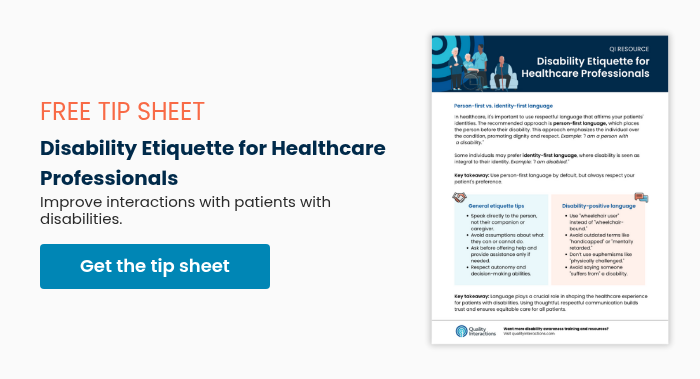
Improving disability awareness in healthcare starts with communication. Respectful, patient-centered language and simple etiquette choices can build trust and improve the care experience for patients with disabilities. Here are practical ways to strengthen awareness and create a more inclusive environment.
How to use respectful language with patients with disabilities
Language shapes how patients experience care. In healthcare, person-first language is generally recommended because it emphasizes the individual over their condition. For example, say “a person with a disability” instead of “a disabled person.”
Some patients may prefer identity-first language because they view disability as part of who they are. When in doubt, ask for their preference. This shows respect and supports autonomy.
Avoid outdated or negative terms such as “handicapped” or “suffers from.” Use accurate, neutral descriptions like “wheelchair user” instead of “wheelchair-bound.”
Disability etiquette tips for healthcare professionals
Respect begins with small actions.
-
Speak directly to your patient, not to a companion or caregiver.
-
Ask before offering assistance, and only help if it is wanted.
-
Avoid making assumptions about what someone can or cannot do.
-
Respect independence and decision-making.
These simple steps reinforce patient dignity and strengthen trust in the healthcare relationship.
Making accessibility part of everyday healthcare practice
Accessibility should be built into daily workflows. Make sure materials are readable, facilities are navigable, and equipment is functional. Encourage staff to keep hallways clear, ensure forms are easy to understand, and make interpreters and assistive tools available when needed. Routine attention to accessibility supports equitable care for everyone.
Why ongoing disability awareness training matters
Disability awareness training helps teams communicate respectfully and identify barriers that patients experience. Regular education ensures staff remain confident and consistent in providing inclusive care.
Nearly one in three U.S. adults has a disability, and these individuals often face barriers that lead to poorer health outcomes. Our Disability Awareness & Person-Centered Care course explores common obstacles to quality care and provides practical strategies for delivering person-centered, accessible care to patients with disabilities. This self-paced, accredited course helps healthcare professionals strengthen communication, awareness, and confidence in disability-inclusive practice. Request a demo today.
Free resource for healthcare teams: Disability Etiquette tip sheet
Our Disability Etiquette tip sheet includes practical reminders on language and etiquette for healthcare professionals. Share it with your team to encourage better communication and more equitable patient care.
You may also like:


